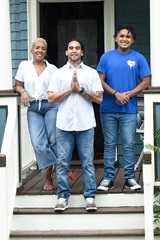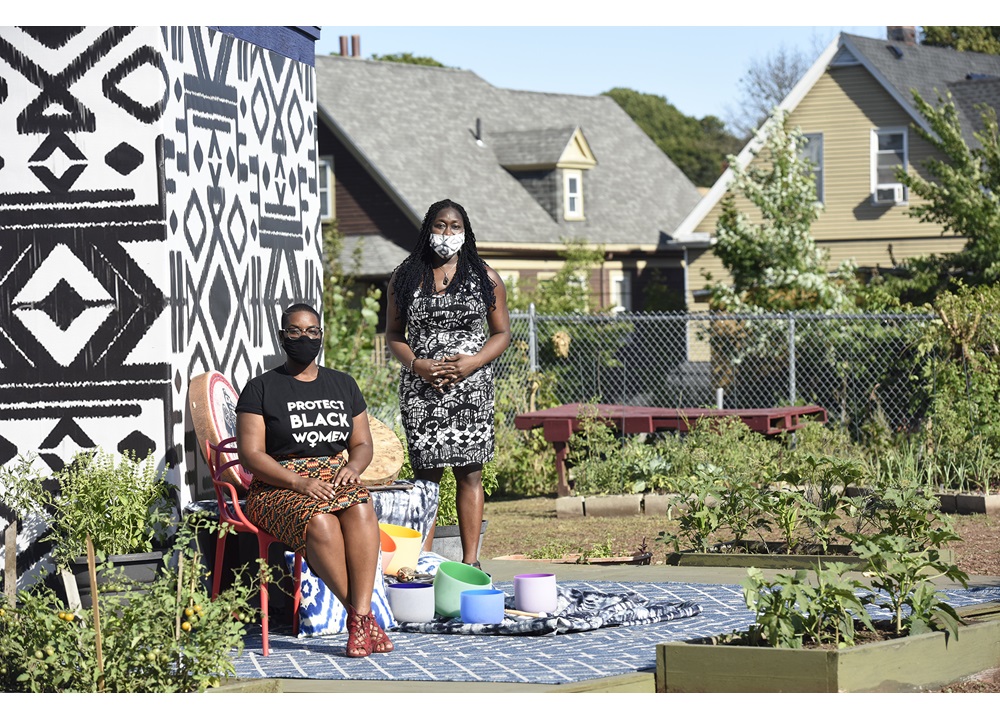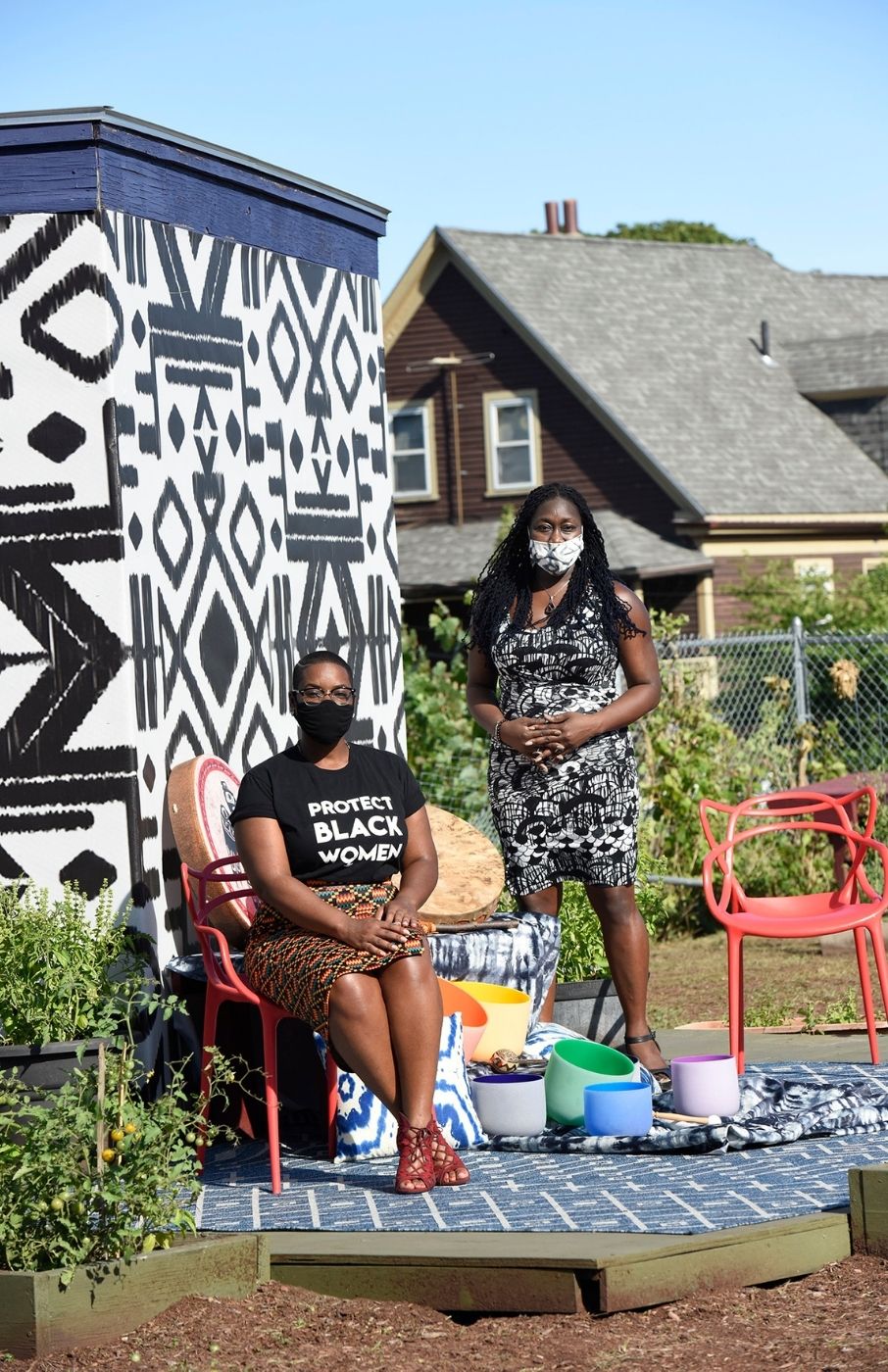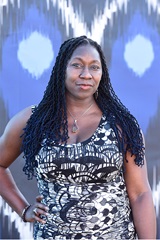Black and Brown People Creating Systems Change
Jennifer Mompoint
The Guild
Where are you from, if you’re not from Boston? Tell us about the things that have shaped you as a person.
The things that have shaped me, I would say are language, my experience as a Black girl in predominantly white schools, losing Jessie, back in 2016, my 2017 trip to India and finding The Guild.
I was born in Boston at St. Elizabeth’s Hospital to immigrant parents from Haiti. My mother is from Saint Louis du Nord and my Dad from Cap-Haitien. I’m the youngest of four children from my mother. My parents were adamant about my education, so they sent me to private schools, which were predominantly White. That was very challenging for me because I never really felt that I belonged. It was hard for me to find a sense of community for most of my childhood.
Growing up in an immigrant household, many would assume we spoke Haitian Creole in the house, but we spoke English with our parents and they spoke creole amongst themselves. My parents made that decision after my sister had issues in school with speaking both languages and her teacher ignorantly claiming she had a learning disability for it. Because of this, my parents stopped speaking Creole in the home. In middle school, I took my first foreign language class, Latin and I received recognition for my academic excellence in Latin which made me feel like I found something I was actually good at. I took French in high school and college, but I still wasn’t feeling confident in my language skills. It wasn’t until I took Wolof lessons about 3 years ago as a surprise to my previous partner, who was from Senegal. It took me about 8 intense weeks of studying and practice before I could compose sentences and write in Wolof Ajami, the traditional script for Wolof. I was beyond proud of myself for my hard work. I love languages and cultures, really I love people and connecting with them and learning a foreign language communicates so much more than words and I love that.
Being in predominantly white spaces growing up, I became accustomed to being misunderstood and with language I felt that it was the ultimate bridge. Learning a new language forced me to be so much more attentive to the nonverbal cues. Speaking someone else’s language did so much more than just communicate words, it showed that I respected them and their culture. Currently, I speak 5 languages of varying proficiencies and I’m by no means fluent in all 5. A while ago, I felt like I needed fluency to say that I spoke multiple languages, and I’ll get there with time. But being able to communicate at even a conversational level is great. Right now, part of my work at the Guild is running a pantry where I get to practice my language skills in Haitian Creole and Spanish. I find that when I at least try to speak someone’s language, it makes them feel more comfortable. English isn’t their first language so when I try to communicate with people in their own language, I get a beautiful reaction. They light up and get more comfortable. They will even start using English words. They appreciate that I’m at least trying to communicate in their language. It puts them at ease.
The second thing that has shaped me tremendously is growing up in predominantly white spaces as I mentioned before, and feeling like an outcast. I remember one of my internet usernames back in the 90s/00s was a “mizunderstoodsoul.” I often got made fun of for using slang, making Black cultural references, or saying certain words with Haitian accent. It wasn’t until I was in college did I start to build a network of people who I could connect with. It was also the time I joined Delta Sigma Theta, Inc. in 2008, a historically Black sorority founded on principles of sisterhood, scholarship and service. To this day, my support system comes from connections I made through DST.
I found out about The Guild in summer 2017 but didn’t officially start going until January 2018. I had lost Jessie in a car accident in Florida and it really shook our entire family. Jessie was very much a free spirit. Whenever she was in the room, you were always smiling. We would listen to music on her little audio cassette and dance and sing together.
I remember the last time I saw her was when I received my masters degree in May 2016. That night after my party, we spoke into the wee-hours of the morning about our lives, going to Trinidad for Carnival, and her being proud of me for my challenges and successes of my journey from losing 50+lbs to teaching myself how to swim and completing 2 triathlons. We spoke about her plans to go to Trinidad for Carnival the following year… she didn’t make it. She passed away 6 months later.
After she passed, I felt guilty, because I didn’t spend more time with her. She would always ask me to visit her in Florida; yet I just never made it out there. The excuses are gone now but in my ignorance they seemed relevant. So I had all of this regret. She was beautiful inside and out. Losing her set me on a trajectory of healing and where I am today with The Guild.
I would not be where I am today if it wasn’t for that experience.
A group of my sorority sisters and a close friend travelled to India for a Holi festival a couple months after Jessie passed. [Holi is called the festival of colors.] It was such an amazing experience. I was there for just under 3 weeks and we traveled to four different northern cities in India: New Dehli, Agra, Jaipur, and Udaipur. The first city we came into was New Delhi and we took a cooking class in a woman’s home. She talked about the culture and then we got to make a few dishes and then we ate. It was a beautiful experience.
The third day we were in India, I got really really sick. So, I’d say the second thing that really was monumental in my life was that experience. I had a raging fever, vomiting, diarrhea, splitting headaches and mild hallucinations; I’d never been that sick. In America, my dad got really sick at the same time. All they told me was that he was hospitalized. So, I’m in India and I didn’t know what was wrong with me and worried about my dad. My close friend who came with us to India was a critical care nurse and she gave me medication. My fever broke, headaches gone, the hallucinations disappeared but I still wasn’t able to digest food properly. For a large portion of our trip, I had a routine where I’d only drink water and banana for breakfast, skip lunch, and eat only rice at dinner. After dinner, I would be sick in my room for the rest of the night. This went on for about 8 days, it revealed in me a mental fortitude that I didn’t know I had. On the road trip from Jaipur to Udaipur, it was as if this mental blockage was released and all these ideas and revelations hit me over the 8 hour trip, including the idea for my first business, The JMom Experience, in-home dining experiences similar to the one I received while in India, but instead I traveled to people’s homes.
In Haitian families, there are really only three professions: doctor, lawyer, engineer. Cooking wasn’t one of them. When I was young, I always loved cooking. I cooked when I was little. I cooked with my grandma. It was never seen as an option for a career though. In high school I had lofty goals of going to the Cordon Bleu in Paris, but my dad wasn’t having it.
While in Udaipur, I found a sign that said “Best Massage in India”. My interest was piqued and I had to go. I went with my sorority sister and it was definitely an experience I’ll never forget. The massage started as a deep tissue realignment massage that had me so relaxed. He turned me over and asked if I wanted him to clear my chakras and at this point I will say I was very ignorant of chakras and energy work but I trusted him after how amazing the massage felt! In my head I thought, “Chakra Do, Chakra Don’t, you can do whatev’a you want!” He started by tapping on my forehead briefly then he moved down to my collar one at the base of my throat for another brief moment. He then tapped on the center of my chest and continued to tap. I felt this flood of grief and sadness that was so immense I couldn’t keep from shaking and sobbing uncontrollably. I later found out it was blocked heart chakra. He said I’d feel lighter after it all and he was right.
So, when I came back to America, I wanted to know more about this kind of emotional work. A different world had opened up for me.
That summer, I ended up going to a yoga event at Park Street, where I met Yoga Mike! [Note: Mike Massey, a.k.a. Yoga Mike, teaches yoga at The Guild.] I had never been in a yoga class where there was a person of color teaching. It was such an amazing experience. He said that he teaches yoga at no cost for the community. I took all of the information, but I never went. Then a friend of mine went and she told me I had to go, like yesterday.
So, when I went to The Guild for the class in January 2018, it was like entering a sanctuary or a cocoon. I remember moments of reaching different physical markers, but the biggest piece for me was the emotional piece. Feeling safe enough to allow myself to cry.
I came to The Guild for the yoga, but it was meeting Jhana [Senxian] and building a relationship with her that truly connected me to The Guild. She gave me a myriad of resources to use for my self-healing and she held space for me to heal in the most loving way, which she still does to this day. I remember coming back to her and we were in her office and I had a purging of emotion around losing Jessie. I had been holding onto Jessie with all of my energy fearing that if not, I’d lose her forever. I had to release the feelings of regret. Jhana was there to guide me through these emotions. I felt this relief and this peace that I had not felt before. So, it was moments like this that embody the emotional, spiritual, metaphysical transformation that can occur when actively engaging with the tools, resources, and physical space of The Guild. The wellness resources and being in a healing sanctuary centered around Black and Brown identity was transformative. It helped me heal, better understand myself, and feel a sense of deep community connection.
For a community that has dealt with generational trauma and institutional racism… Being able to have a space where you can connect to your spirituality, emotional healing, and overall learn to be at peace in a sanctuary space, it’s priceless and so severely needed within our community. I taught me what it looked like to actively put myself first unapologetically and then I could be helpful to others.
When you enter a Guild-curated space, it’s like nothing you’ve ever experienced. The peace and calm, the beautiful visuals with artwork and interior design, the music, the incense - it’s a holistic experience from top to bottom. It’s about creating that space for people to first breathe out and relax and next build their practice for self-healing. Especially now, when everyone is on edge and there are so many things shifting. I think we’re seeing the destabilization of something old and I hope we will come out of this by building something beautiful and inclusive that is meant to support and encourage everyone. This is part of the work of The Guild: changing systems, shifting paradigms; this work is critical now more than ever. As someone who’s actively moving through my healing process with the things I learned from The Guild. I wouldn’t be where I am today without it.
So, Jhana is my mentor. Have you heard about the metaphor of all relationships being like a tree? The idea is that you have the root, the branches and the trees. So the roots that are the few really grounding people in your life. And Jhana is one of those roots for me.
I started this work right before COVID happened. I spent a lot of time at The Guild and I chose to work here because I wanted to be a part of a revolution that put healing at its core with a focus on the life experiences and healing needs of BIPOC, Black indigenous people of color. I was excited when Jhana asked me to join the team. I had been in this space for a couple of years; I had done yoga, body work, got Reiki certified, and took an herbalism course. Now I was able to be a part of bringing the same tools that shaped me, to more Black and Brown communities in need. It’s so impactful.
Through your lens and the journey that you’ve been on and also the promise of The Guild, when you think about our city, what do you see as the challenges we’re facing, the role that The Guild can play in that?
The most urgent issue in Boston is the lack of affordable housing and the growing displacement of POC communities who are forced out, lose out on job opportunities due to lack of transportation in the suburbs, compared to the city, as well as losing access to community-based supports all due to gentrification.
The other big issue is healing. That’s a huge part of what The Guild is doing. Through The Guild, I learned critical tools for self-healing and in my role here at the Guild developing my leadership skills like never before. To have the tools and the space for healing is so important. If you are destabilized and you don’t have a space to go to in order to get away from the toxicity, the acute and chronic stresses and traumas of unjust systems, you suffer feelings of social isolation and you don’t have the necessary tools, it’s so very hard. I had a difficult relationship with my father and that was probably the first trauma I experienced. Being able to understand and forgive was the way I moved through the emotional baggage, forgave my father, and built a beautiful friendship with him since his first severe illness in 2017. This healing not only affects our children, but our parents and our ancestors. We heal generationally. We have to be able to fulfill who we’re supposed to be in this life and parents are our first teachers. So, not holding on to that toxic relationship, learning the lesson it served to teach me - it has been a very beautiful transformation that I needed. And The Guild is a place where that kind of transformation can happen. So, I want to bring that to as many of our people as possible. It’s very hard to move ahead in a healthy or sustainable way without it. Having safe space within a loving community, tools for healing, and opportunities for growth is fundamental; it’s honestly crucial. That’s the work the Guild is doing, it is transformative and changes the landscape for BIPOC communities who need these sanctuary spaces. Over the next ten years, I want to see community healing sanctuaries not just in Boston but worldwide. The reality is that Black and Brown neighborhoods all over the city, the state, the nation, and beyond are in dire need of sanctuary space.




